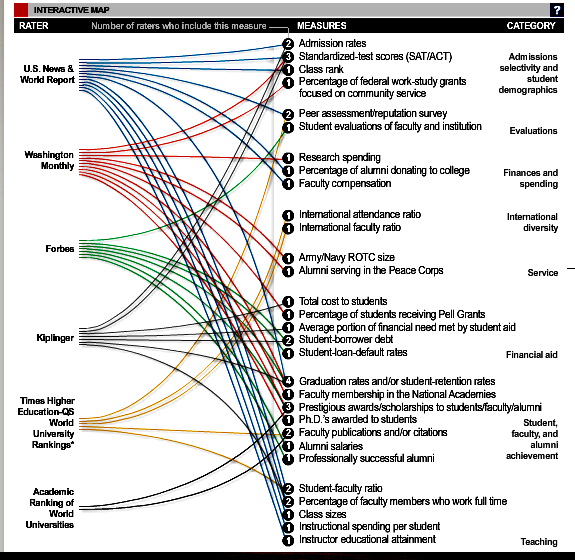More on College Rankings – No Consensus on Objective Criteria?
The Chronicle of Higher Education, most likely the No. 1 source of news and information for college and university faculty members and administrators, often provides a revealing perspective when it comes to colleges and universities. The site is visited by more than a million unique visitors each month and sees more than 12 million page hits in the same time period.
A nine-time finalist for the National Magazine award, the Chronicle recently offered a thought-provoking graphic as part of Alex Richards and Ron Coddington’s 30 Ways to Rate a College. We offer a page snap shot of the graphic:

In the graphic, readers can see that lines are used to connect an organization/publication rating colleges to the specific measures those raters take into account when determining their rankings. As Richards and Coddington point out, the visual offers striking information.
Their first point is to note how few measures are shared by two or more raters. In other words, each rater has deemed different elements to be of critical importance. The writer’s note simply:
That indicates a lack of agreement among them on what defines quality.
Furthermore, the writers note that the emphasis seems to be on various “input measures” even if different measures are used. Student selectivity, faculty-student ratio, and retention of freshmen are examples of “input measures.”
While there should be a final product, Richards and Coddington point out how few output measures appear within the list of criteria being used. They note that only graduation rates would truly qualify as “outcome measures.”
We wrote last week regarding our skepticism about the college rankings system currently in vogue. We suggested that it was nothing more than an effort to sell magazines and newspapers and that the ratings process provided very little value to students considering various colleges.
The Chronicle’s graphic represents a complete condemnation of the process and simply furthers our view that these organization’s/publications are preying upon a poorly educated public.
College applicants need to understand why so many bloggers insist that college students should pay little attention to rankings.

